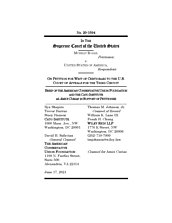Learn more about Cato’s Amicus Briefs Program.
Murray Rojas is a licensed horse trainer in Pennsylvania who was charged with a federal crime for allegedly administering drugs to a race horse less than 24 hours before a race. Rather than allowing Pennsylvania to decide whether it wanted to prosecute Ms. Rojas, federal prosecutors highjacked the case and twisted the federal Food Drug and Cosmetic Act (FDCA) until Ms. Rojas’s conduct fell under its purview. In the process, Pennsylvania lost its meaningful choice in how to police its citizenry and federal prosecutors upset the delicate balance between state and federal criminal law.
The Constitution vests Congress with only certain powers, including the power to punish three enumerated crimes: counterfeiting, piracy and felonies on the high seas, and treason. It would surprise the Framers, therefore, that there are currently more federal crimes than anyone can count, and those crimes encompass just about the entire range of human behavior.
States are supposed to have the primary role in enacting and enforcing criminal law. As Congress began creating laws penalizing conduct beyond the select few crimes specified in the Constitution, however, the Supreme Court began to slightly circumscribe Congress’s ability to punish purely local crimes. In United States v. Lopez, for example, the Court held unconstitutional the federal Gun-Free School Zone Act due to the act’s criminalization of purely local conduct that was not sufficiently connected to interstate commerce. There’s also the old common-law rule of lenity, which holds that ambiguous criminal statutes should be interpretated in favor of the criminal defendant. The rule of lenity holds special importance when courts construe statutes that could upset the federal-state balance in the area of criminal law.
Far from using this restrained approach to protect individual liberty, the Third Circuit upheld Ms. Rojas’s prosecution by ruling that the FDCA should be construed liberally, resulting in an expansion of activities that would be considered crimes under the Act. This flips the rule of lenity on its head and is a dangerous precedent that could expand our already expansive federal criminal law.
The Cato Institute has joined the American Conservative Union Foundation on a brief supporting Ms. Rojas petition to the Supreme Court. We argue that the Third Circuit abdicated its duty to fairly interpret the FDCA by examining its text and context, and that this decision has upended the traditional balance of power between the federal government and states on matters of criminal enforcement. Our brief urges the Supreme Court to take this case and clarify that a liberal construction of statutes has no place where the rights of criminal defendants are at stake.

This work is licensed under a Creative Commons Attribution-NonCommercial-ShareAlike 4.0 International License.


